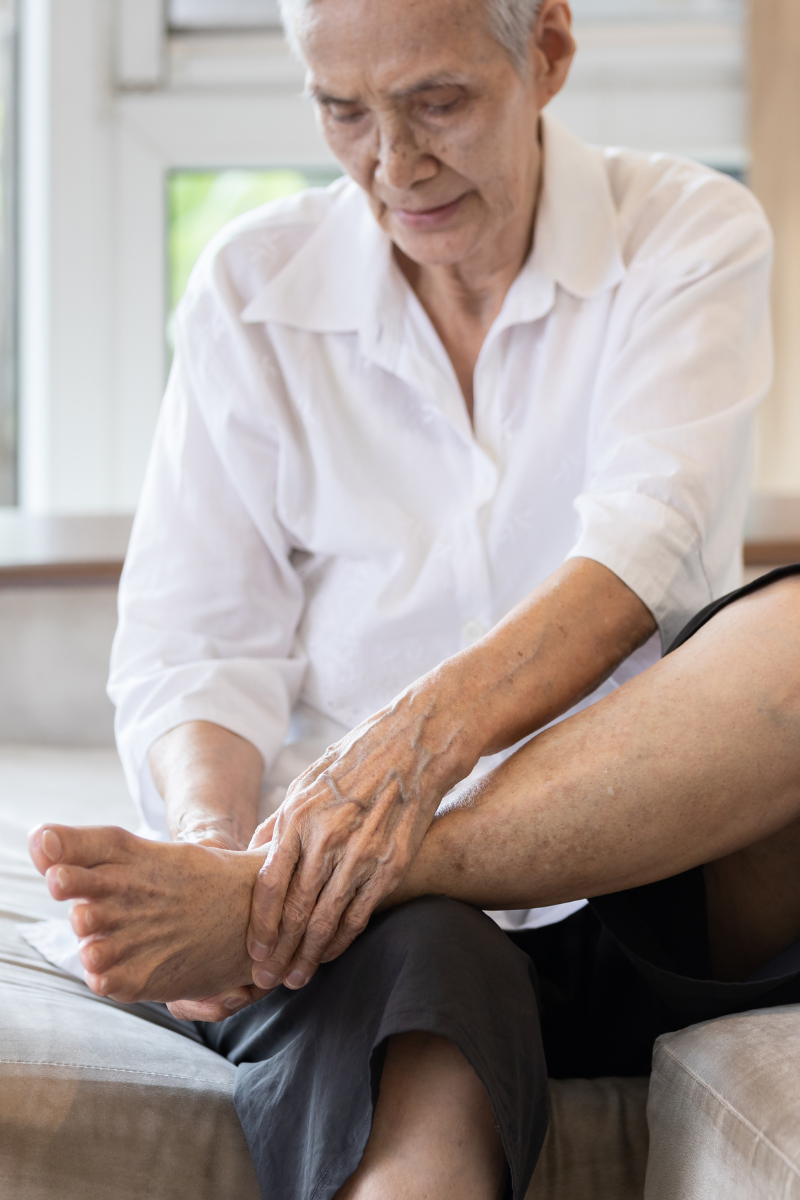March 27, 2025
Leg Pain, Cold Feet, or Slow-Healing Sores? It Might Be PAD.
Peripheral artery disease (PAD) is a common circulatory problem in which narrowed arteries reduce blood flow to your limbs, primarily affecting the legs and feet. PAD often results from atherosclerosis, where cholesterol deposits build up in the artery walls and restrict blood circulation.
Symptoms of peripheral artery disease
The primary symptom of PAD is muscle cramping in the hips, thighs, or calves during physical activities such as walking or climbing stairs. This discomfort generally disappears after a few minutes of rest. Other symptoms include: 
- Leg numbness, weakness, cramping or pain
- Coldness in the lower leg or foot, particularly when compared with the other side
- Sores on toes, feet, or legs that do not heal quickly
- Changes in the color of the legs
- Hair loss or slower hair growth on the feet and legs
- Slower growth of toenails
- Shiny skin on the legs
Risk factors for PAD
Key risk factors for peripheral artery disease include:
- Smoking: Smoking is the single biggest risk factor for PAD, as tobacco use drastically speeds the formation of plaques in arteries.
- Diabetes: High blood sugar levels can cause damage to blood vessels, making them more prone to narrowing.
- High blood pressure: Hypertension can weaken arteries over time, making them susceptible to damage.
- High cholesterol: Higher cholesterol levels contribute to the buildup of fatty deposits in the arteries.
- Age: The risk of PAD increases with age, particularly after 50.
- Family history: A history of vascular disease among close relatives can increase your risk.
Why PAD matters
PAD is not merely a cause of leg pain; it indicates other arterial issues that could lead to severe health events, including heart attacks and strokes. If untreated, PAD can lead to critical limb ischemia, gangrene and possible limb amputation.
Prevention and treatment
Early diagnosis and lifestyle modification are important strategies for managing PAD. Essential preventive measures and treatments include:
- Quitting smoking: This is vital for improving overall vascular health.
- Regular exercise: This helps improve circulation and mobility.
- Healthy diet: A balanced diet can help reduce blood vessel damage.
- Medications: Drugs may be prescribed to manage pain, improve blood flow, or prevent blood clots.
- Surgical interventions: In severe cases, procedures like angioplasty or bypass surgery may be necessary to restore adequate blood flow. Some procedures can be completed in a minimally invasive way and do not always require an overnight stay in the hospital.
Prompt consultation with a healthcare professional is crucial if you experience any symptoms of PAD. Early intervention can significantly enhance the quality of life and diminish the risk of severe complications.
Choose the right care
When you need individualized, comprehensive cardiovascular care, Elliot Heart and Vascular Center is here for you. Our expert team of vascular surgeons, cardiologists, interventional cardiologists, and electrophysiologists, supported by skilled nurse practitioners, nurses, technicians, and staff, brings decades of experience caring for the greater Manchester, New Hampshire community. As part of Elliot Health System, a non-profit healthcare organization rooted in Manchester since 1890, we connect patients to a wide range of high-quality, integrated healthcare services. With cutting-edge technology and advanced procedures, Elliot Heart and Vascular Center is committed to delivering compassionate, innovative care for the best possible outcomes.
Are you ready to take charge of your heart health? Call Elliot Heart and Vascular Center today to schedule a consultation at 603-627-1669 or visit our website. We look forward to partnering with you on your heart health journey.
 Dr. Robert W. Abdu, a fellowship-trained vascular surgeon at Elliot Heart and Vascular Center in Manchester, New Hampshire, specializes in treating peripheral vascular disease and aortic aneurysms, offering expert care for patients with PAD.
Dr. Robert W. Abdu, a fellowship-trained vascular surgeon at Elliot Heart and Vascular Center in Manchester, New Hampshire, specializes in treating peripheral vascular disease and aortic aneurysms, offering expert care for patients with PAD.
